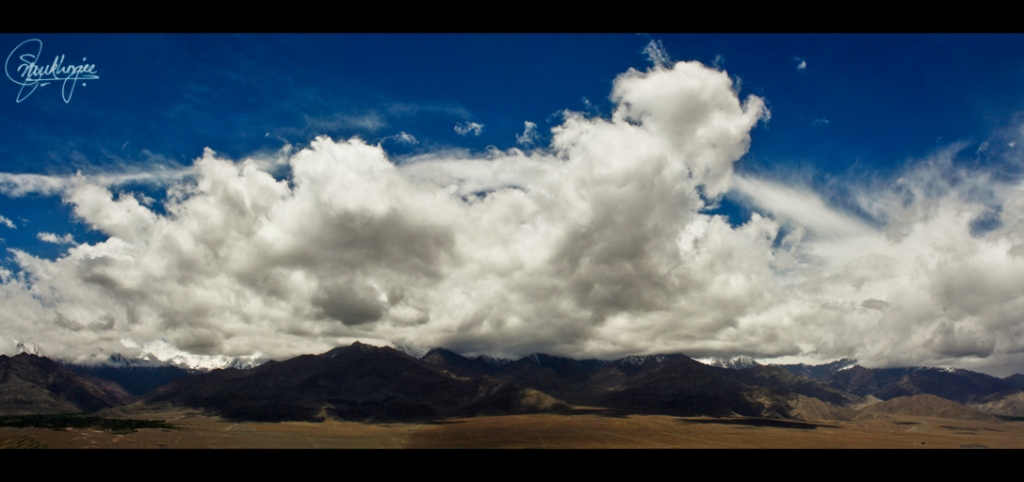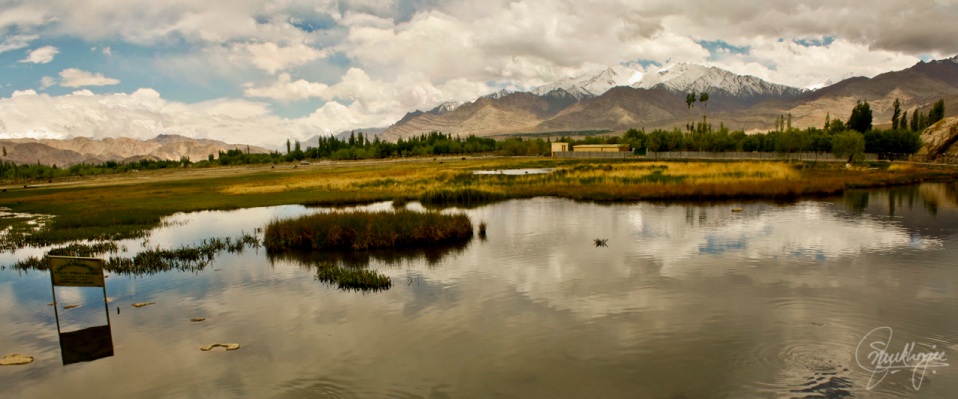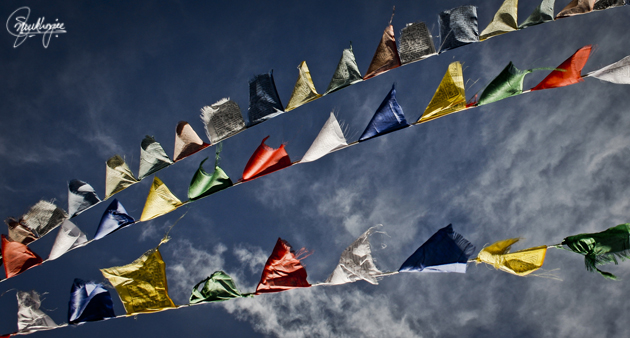Posts Tagged ice
Ladakh – Of Poetic Panoramas
Posted by Pensive Polaroid in Tales from Travels on August 19, 2011
Ladakh, a land where Nature takes charge, dabbing its emotions with strokes of beauty and uncertainty, in a metric expressing of it’s gallantry in the chilling winds, impregnable majesty in the mountains, oft flirting with safety in the narrow ornamental winding paths adorning the rise of her dun bosom, and oft being a haven in its cradle of immovable cliffs . With rivers gently caressing the land, deserts amidst snow capped mountains and a vivid biodiversity, Ladakh is a treat to the inquisitive soul, and is at once humbling and overwhelming, educing poetry out of expressions of enthralment and stunned silence in the admiration of tangible metaphors of infinity and eternal magnificence.
In my insignificant attempt to bring her beautiful visage through the brunt of space and time, I present with utmost humility a series of panoramas I stitched which act as my reminiscence. I invoke the words of great Bards, for my own cannot carry the multitude of emotions that would deem fit such a demanding muse.
Cloud Connected
(Ladakh is an intense drama with clouds as the prime dramatis persona.)
“Full many a glorious morning have I seen,
Flatter the mountain-tops with sovereign eye.
Kissing with golden face the meadows green,
Gilding plain streams with heavenly alchemy.”
– Sonnet 33 : Shakespeare
The ever changing textures and contours of a dense cloud cover could put Rorschach’s name to the test. It’s a beauteous sight, beholding the swirling ocean of clouds crashing against the mountains. The journey to and from Ladakh, too, is an experience of sorts, where the aircraft takes you over this Valhalla.
A tryst with tranquility
(Traditions mark the lives of people in Ladakh. This one in particular is a fish pool where passersby drop crumbled comestibles for their Piscean pals )
“So are you to my thoughts as food to life,
Or as sweet-season’d showers are to the ground;
And for the peace of you I hold such strife
As ‘twixt a miser and his wealth is found.”
– Sonnet 75 : Shakespeare
There are few occasions in life where one can stand still and wander, gathering their thoughts and trying to fathom the immensity within and its worthy opponent beyond. Were it not for the six foot fence that stood between me and this landscape, I might have drifted into an oblivion of time.
Mackenna’s Cold
(A view of Khardung La Pass, the highest motorable road on Earth. It stands at a chilling 18,300 feet above sea level and is freezing in broad daylight.)
“I think I’ve seen enough of hate
To know that for destruction ice
Is also great
And would suffice.”
– Fire and Ice : Robert Frost
It takes the most audacious of drivers the most enduring of vehicles and a handsome amount of time to meander their way along the hairpin bends and muddy paths, with frozen puddles all along and chunks of ice, renounced by the snow caps, jarring the narrow roads to travel from Leh to Khardung La. Setting foot outside at the highest junction drenches you in a sub zero barber. The sight translates to Gregory Peck and Omar Sharif’s classic Mackenna’s Gold, only that the gold here is glittering ice all around.
The Nubra Valley
(The Nubra Valley is a mountain desert, at the heart of snow capped mountains, close to the Disket monastery)
“Some say the world will end in fire,
Some say in ice.
From what I’ve tasted of desire,
I hold with those who favour fire.”
– Robert Frost
To start off with a disambiguation, I apologize for having invoked the latter half of Frost’s verse preceding the preamble, for the previous photograph. If it serves the purpose of defence, then it was inevitable because you have to pass through Khardung La before you reach Nubra, the desert land. And I had to profane the continuity of either. Nubra, with its dunes demurred in their pallid manifestation by the snow capping the mountains around, alone, is the holy grail to a five hour journey, snaking through the mountains and cliffs. A ride to the heart of the desert gives a breathtaking view of a divine elemental union, with the temperature rising with every footfall of the enduring Bactrian Camel. It is the first stop in hours before you behold the humbling Future Buddha statue in Disket Monastery.
Lonely Planet
(Another sprawling view of the mountains and cloudscape along the roads of Leh.)
“Anon permit the basest clouds to ride
With ugly rack on his celestial face,
And from the forlorn world his visage hide,
Stealing unseen to west with this disgrace.”
– Sonnet 33 : Shakespeare
The clouds cast a westward shadow over the rocky terrain, with a gentle rivulet ambling down the valley. The play of bright sunlight and shade is a frivolous daytime activity, as the misty shoulders of the mountains tend to beckon with a divine charm to them.
The Indus-Zanskar Confluence
(The junction of the Indus and Zanskar rivers, Indus Valley)
Beyond the magnetic hills, the valleys open up to an amazing sight where the two great rivers unite. Their names emblazoned in the deciduous ink of school texts have a frail presence in one’s memory always, and seeing them in their might only immortalizes their essence. The rivers freeze in the winters drawing adventure tourists to test their calm against the cold stare of a siberian solid.
The road not taken
(This is a photograph I had waited to shoot for long. The vanishing road without a sign of movement upon it, flanked by a barren landscape on either side was too tempting for me to consider not stopping.)
“Two roads diverged in a yellow wood,
And sorry I could not travel both,
And be one traveller, long I stood
And looked down one as far as I could.”
– Robert Frost
It was too perfect a sight, the etude of the clouds’ harmony to a gaping audience of mountains and rocks as I stood on the concrete aisle of this divine orchestration. Robert Frost’s words could to me not find a better simile than that stood facing me. As a memento, I shot 22 photographs which were stitched into this panorama, for the journey must go on…
Genesis
(The Indus Valley)
“For since each hand hath put on Nature’s power,
Fairing the foul with Art’s false borrowed face,
Sweet beauty hath no name, no holy bower,
But is profaned, if not lives in disgrace.”
– Sonnet 127 : Shakespeare
I waited for the group of tourists to quench their thirst of posing with the timeless, the infinite, an act preposterous for the unfound superimposition of what is not to stay with what shall not succumb to the ghastly march of time. The immaterial viz-a-vis the immemorial. But perhaps that is the joy of being. How light does not distinguish by the yardstick of a time scale. This shot was inspired a lot by the works of the legendary Magnum photographer Ansel Adams, and I tried a monotone rendition of the landscape.
Leh, Chanspa from Shanti Stupa
(This was actually the very first panorama I shot, from the balcony of the Shanti Stupa. The winds were too strong and too cold for me to maintain a steady hand, but this is the best I could.)
The end of this journey was more of a beginning. As I discovered myself more than I did the pristine beauty of Ladakh. It is amusing how just a slight elevation in altitude, negligible to the planet as a whole, a hostile drop in temperature and a fractal landscape of mountains is all it takes Nature to come up with to thwart the all complacent progress of man at the cost of her sanctity. It is but a reflection of one’s physical mortality, albeit the spiritual ascension at this altar of immaculate confluence of Nature’s forces. A memento mori. And yet the all providing mother doesn’t mean to intimidate alone, for in the immensity also lies her beauty, a vibrant variation of divine artistry in the geology, skies, lakes and landforms. It is, if anything, overwhelming.
But my spirit is free
“So long as men can breathe, or eyes can see,
So long lives this, and this gives life to thee.”
– Sonnet 18 : Shakespeare
For more photographs from the trip, I invite you to see my album “Live Ladakh” on Facebook. This being my first post here, I’d be glad to have you share this and leave your opinion on.
I shall take my leave of you, as of now. Will get back to penning down the remnant of the journey soon enough. Here’s a message to see you off with from Ladakh.
Om Mani Padme Hum
Until then.
– Siddhartha










